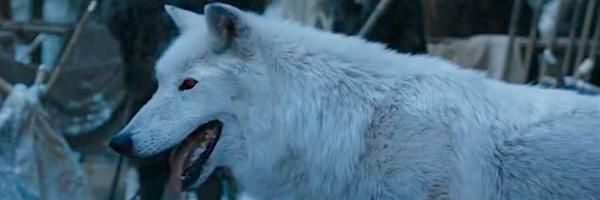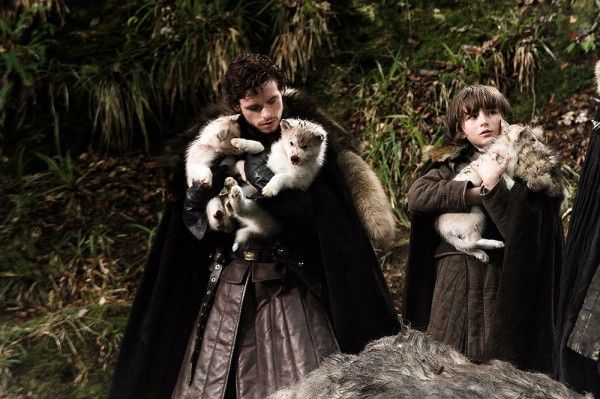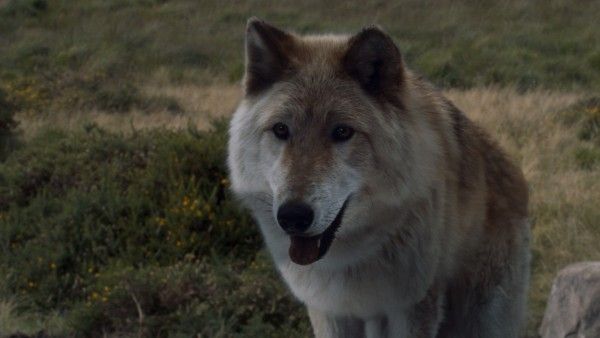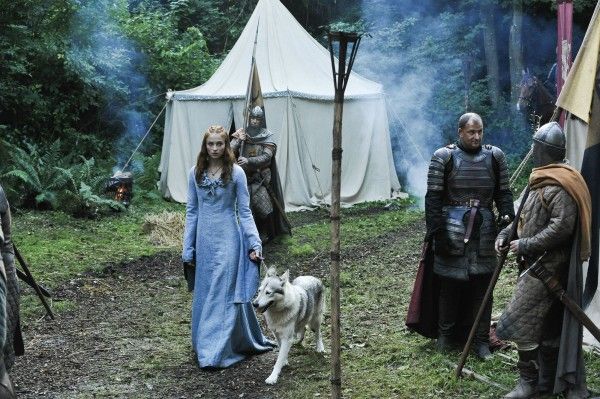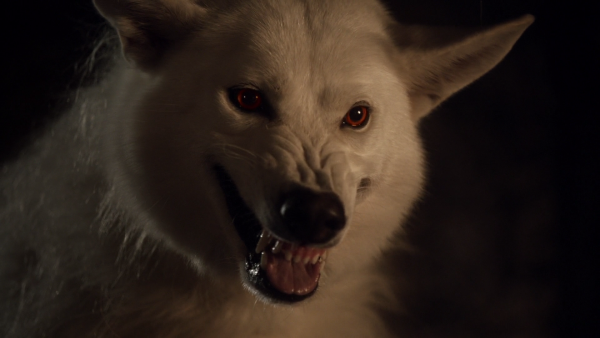Spoilers through Season 6's episode "The Door” are found below; the direwolves’ fates from the books are also referenced.
The fact that Game of Thrones is set in the fictional land of Westeros (and slightly beyond) is not what makes it distinct from just being some kind of alternative medieval history. It’s the element of magic — specifically, the dragons. There is other magic, of course, but let’s admit that despite characters being oddly unimpressed by them (until they start charring things), dragons are the main feature. And yet, there is another magic that is possibly just as important, yet woefully underused: direwolves.
Direwolves are not normal creatures. Firstly, they are huge (the books reference them as being as large as ponies). They also were thought to be extinct for hundreds of years in Westeros, until Robb Stark finds six puppies orphaned in the woods at the start of the series. Each Stark child is then given a wolf pup: Robb / Grey Wind, Sansa / Lady, Arya / Nymeria, Bran / Summer, Rickon / Shaggydog, and then Jon Snow receives the albino pup of the litter: Ghost.
It’s surely no coincidence that these magical beings, thought to be long gone from the realm, arrive shortly before other magical beings thought extinct also end up being born: dragons. The book series is called “A Song of Ice and Fire” — dragons represent one end of that, and the North represents the other. You could argue (likely correctly) that the Others and the Night’s King also represent the “ice,” leading to a final battle, perhaps, between dragons and the dead. Even still, direwolves play an important role in the story.
The most important thing direwolves can do, besides be badass companions (Robb Stark likely won many of his battles thanks how terrified everyone was of Grey Wind, and how much damage he inflicted — it’s one reason Grey Wind’s head was sewn onto Robb’s body after their deaths), is that they are also “bonded” to each Stark child. Beyond just loyalty, the bond is a magical one, where the children can warg into their animal, and the animals also share their personality traits. Unfortunately, this isn’t something, tragically, any of them discover except for Bran (and perhaps Rickon and Jon, though more on that later).
In the books (like the TV series), some of the direwolves do, of course, die. Grey Wind dies with Robb, and Sansa’s direwolf Lady is executed for attacking Joffrey (in actuality it was Nymeria who attacked him, but she hid afterwards, and Cersei demanded Lady pay for it). But the rest appear to be thriving. Nymeria and Arya part early on, but there are rumors that she is leading a huge wolf pack in the forest, something the show hasn’t referenced at all. (Is it important? Who knows, but it seems like it should be. It's awesome, regardless.) Summer, meanwhile, accompanies Bran & Co north of the Wall to meet the Three-Eyed Raven. While in the books, Bran wargs into him regularly to run and feel free, here he's reintroduced just to be killed off -- in yet another unnecessary death -- by white walkers. Ghost has had very little to do at the Wall, and Jon seems to forget about him more often than not — he’s almost never used in battle or as protection, and doesn't seem to be accompanying him on his journeys to convince the Northmen to his cause. (One theory about Jon’s resurrection is that his spirit warged into Ghost until Melisandre brought him back, though Ghost didn’t seem to exhibit any different traits to suggest that Jon was biding his time there).
Realistically, including direwolves (and dragons) into the visuals of the show can be a money drain, so it’s understandable that the series uses them sparingly. Further, in the books, all of the warg action is experienced and explained through internal monologues, and while the series has briefly broached the ability in a dream-like sequences, it could be a little hokey to show regularly onscreen.
Still, the power of direwolves is one that viewers, and certainly readers, are still attuned to, yet they are never given their proper due in the show. In “Oathbreaker,” Rickon Stark is presented to Ramsay Bolton as a sign of loyalty. We haven’t seen Rickon in years, and he’s one of the biggest mysteries of the series. But, his connection with Shaggydog was also one of the most interesting. Shaggydog is basically like a feral beast, with the books describing him as being full of “fear and rage,” which is a potent and frightening combination for an animal. Rickon and Shaggy appeared to share a close bond, and so when Rickon was brought to Ramsay with Shaggydog’s head, it was devastating. Why kill another wolf?
“Oathbreaker” seemed, in many ways, like a Stark child check-in. They all live, except for Robb, and while Game of Thrones sets them up as the hero family before decimating, torturing, and scattering them to the four corners of the realm in a subversion of a hero trope, one wonders if they will return, reunite, and reign again. In the books, the direwolves can feel each others’ presence, even when they are far away. They know when one of the others has died, and some are lost from the pack in both a literal and metaphorical sense. It mirrors the Stark children, who at first at least have a general sense of where the others are, but over time, believe the others could be dead (and in some cases, hope they are for their own sakes).
There are some theories that the head presented was not Shaggy’s, but one doctored up to look like a direwolf in order to convince Ramsay of who Rickon was. If Shaggy ends up tearing through there and eating Ramsay (sooner than later, please), then I’ll take almost all of this back. But in general, the show minimizing the direwolves is just minimizing what seems like a key part of the story, and the realm’s mythology — something the show has done a woefully poor job of including up to this point. In the books, the last vision Ghost has of his brother Shaggy is him fighting a unicorn. Game of Thrones needs to remember that what makes this story sparkle is its tinges of magic. To lose that is to lose everything.

